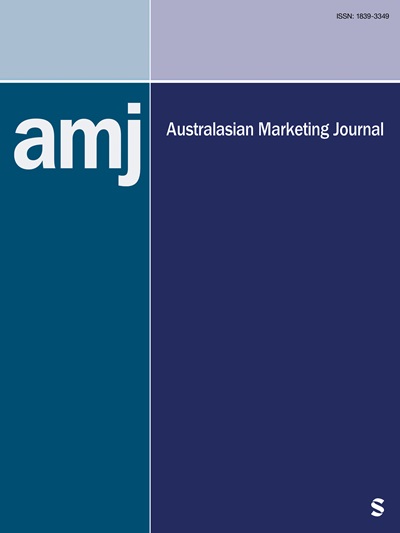营销中对粗俗的接受:产品类型和消费者政治意识形态的调节作用
IF 4
Q2 BUSINESS
引用次数: 0
摘要
关于厌恶理论的一个争论围绕着这种情绪是由适应主义还是文化敏感性引起的。我们通过检查亵渎引起的厌恶来检查这个问题。本研究考察了预测消费者在广告语境中接受粗俗语言的两个调节因子。具体来说,我们关注的是产品类型(新与旧)和消费者的政治意识形态(保守派与自由派),提出保守派(vs自由派)不太接受使用粗俗语言宣传的新(vs现有)产品。这可能是因为,我们提出并发现,保守的消费者对厌恶情绪更敏感,使用粗俗语言的新产品广告会引起更多的厌恶。我们进行了三个实验来验证这些假设。实验1为我们的整体假设提供了支持,而实验2和3通过中介和调节技术为厌恶的作用找到了证据。我们的研究结果表明,厌恶情绪是由文化驱动的,而不仅仅是由进化敏感性驱动的。据我们所知,我们也是第一批将厌恶文学与粗俗语言联系起来的作者。因此,我们的研究结果为营销中粗俗语言的使用提供了实践和理论意义。本文章由计算机程序翻译,如有差异,请以英文原文为准。
Acceptance of vulgarity in marketing: The moderating roles of product type and consumers’ political ideology
One debate about theories of disgust surround whether the emotion is elicited by adaptationist or by cultural sensitivities. We examine this question by examining the disgust that profanity elicits. This research examines two moderators that predict consumers’ acceptance of vulgar language within advertising contexts. Specifically, we focus on product type (new vs old) and consumers’ political ideology (conservative vs liberal), proposing that conservatives (vs liberals) are less accepting of new (vs existing) products advertised using vulgar language. This is potentially because, we propose and find, conservative consumers are more sensitive to the disgust emotion, and new products advertised with vulgar language elicit more disgust. We conducted three experiments to test the hypotheses. Experiment 1 finds support for our overall hypothesis while Experiments 2 and 3 find evidence for the role of disgust via both mediation and moderation techniques. Our findings suggest that the disgust emotion is driven by cultural and not purely by evolutionary sensitivities. We are also the first authors, to our knowledge, to connect the disgust literature to vulgar language. Hence, our findings offer both practical and theoretical implications regarding the use of vulgar language in marketing.
求助全文
通过发布文献求助,成功后即可免费获取论文全文。
去求助
来源期刊

Australasian Marketing Journal
BUSINESS-
CiteScore
14.90
自引率
16.70%
发文量
25
期刊介绍:
The Australasian Marketing Journal (AMJ) is the official journal of the Australian and New Zealand Marketing Academy (ANZMAC). It is an academic journal for the dissemination of leading studies in marketing, for researchers, students, educators, scholars, and practitioners. The objective of the AMJ is to publish articles that enrich and contribute to the advancement of the discipline and the practice of marketing. Therefore, manuscripts accepted for publication will be theoretically sound, offer significant research findings and insights, and suggest meaningful implications and recommendations. Articles reporting original empirical research should include defensible methodology and findings consistent with rigorous academic standards.
 求助内容:
求助内容: 应助结果提醒方式:
应助结果提醒方式:


